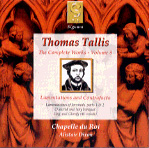The same solid musicianship, stylistic authority, and clearly detailed vocal textures that informed earlier volumes in this fine series also defines these performances. For this next-to-last disc in the series, Chapelle du Roi and Alistair Dixon offer Tallis’ two settings of Lamentations of Jeremiah, filling out the program with “contrafacta”, or English-text versions of original Latin-texted works. This was a common practice in Reformation England when there was an urgent need for vernacular liturgical music–and Tallis obliged with some very adroit adaptations, perhaps the most interesting of which is Sing and glorify heaven’s high majesty, more famously known as Spem in alium, the 40-part motet that’s been recorded many times with varying degrees of success. In fact, this choir previously issued this and the original version of Spem in alium together on a single CD (type Q7507 in Search Reviews) and the Latin version also appears on Signum’s Complete Works Volume 7 (type Q7653).
Although the male-voice Lamentations receive fine enough performances–well-paced, sensitive phrase and section endings, and good ensemble balance–the competition in these pieces gives the edge to the reference versions for just that much more expressive range (Tallis Scholars) and an unmatched beauty of vocal quality and blend (Hilliard Ensemble). The best singing comes in the more tuneful motets such as I call and cry to thee and the mixed-voice works, especially O sacred and holy banquet, and, perhaps best of all, When Jesus went into Simon the Pharisee’s house (with its marvelous sequences of cross-relations). The sound remains a bit “edgy”, but the penetrating solo soprano voice is much less evident here than in some past volumes, probably due in large part to the scoring configurations of these motets. In all, this is another excellent effort–again enhanced by well-designed packaging and informative notes–that Tallis fans shouldn’t hesitate to add to their collections. [2/23/2005]
































